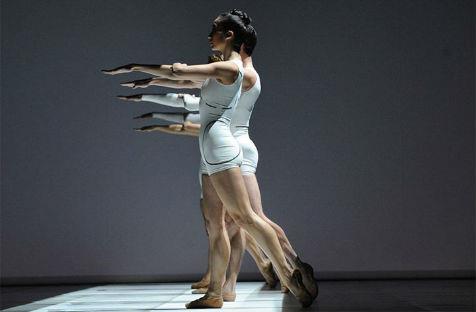As part of its 100th birthday celebrations Canberra hosted the Australian Ballet in a short programme entitled ‘Symmetries’, which included a specially commissioned work ‘Monument’ choreographed by Garry Stewart.
First, however, was Balanchine’s ‘The Four Temperaments’ (1946) which oddly enough I enjoyed much more here in this Canberra performance than in the recent Sydney season. In this work Balanchine analyses and presents the formal structure and vocabulary of ballet in an abstract, almost clinical way. The sparse, refined choreography was performed elegantly and with great panache – it seemed new and fresh as if seen through different eyes.
The dancing as always was magnificent. Andrew Killian shone in his blazing ‘Choleric’ solo. Canberran Lana Jones also dazzled in her home town, giving a tremendous performance. And Leanne Stojmenov was marvellous. In this performance what I especially noted was the use of supported pirouettes in the opening section, demanding incredible control.
Sheer theatrical bliss for the haunting, lyrical pas de deux from Christopher Wheeldon’s ‘After the Rain’, performed by Robyn Hendricks in a soft pink leotard and Rudy Hawkes in white trousers with a grey waistband. The magical, wistful, elegiac loving atmosphere was palpable. Fiendishly difficult to perform it was a giant crowd pleaser.
After interval came the specially commissioned ‘Monument’, choreographed by Garry Stewart of the Australian Dance Theatre. Sharp and futuristic in atmosphere and appearance it is based on the concept of the construction of the ‘new’ Parliament House and Canberra. Rear projections of animated linear architectural maps and plans were used. It was as if the dancers were the spirit of an architect’s imagination.
Sometimes the dancers, in white costumes with black lines, were like ancient Egyptians (Stewart’s choreography incorporates ‘Tutting’) measuring and/ or laying foundations. They moved with angular arms in corridors of light, at various points in dynamic diagonal blocks of movement or contrasting frieze –like sections across the stage. Sometimes it was as if the dancers were alien beings, descending from somewhere to mysteriously build Canberra.
The work uses typical very demanding Stewart choreography – I was particularly reminded of his ‘Birdbrain’ – but it wasn’t quite as ‘way out’ as it possibly could have been. Splintered, fragmented short solos are incorporated into the writhing sculptural ensemble masses. At one point there is an ‘Expressionist’ machine like tableaux. Very effective use is made of silhouette. Huey Benjamin’s soundscape was a hypnotic, driving, edgy score that includes Tibetan chant and percussion.
A most exciting triple bill greeted with especial delight by native Canberrans.
Running time – 100 minutes (approx) one interval
CANBERRA THEATRE CENTRE
MAY 2013
4 stars
The Four Temperaments
Choreography: George Balanchine
Repetuteur: Eve Lawson
Music: Paul Hindemith ‘The Four Temperaments’
Lighting design: Ronald Bates, reproduced by Graham Silver
Solo pianist: Stuart Macklin
Pas de deux from After The Rain
Choreography: Christopher Wheeldon
Music: Arvo Part ‘Speigel im Speigel’
Costume design: Holly Hynes
Lighting design: Mark Stanley reproduced by Graham Silver
Danced by: Robyn Hendricks and Rudy Hawkes
Monument
Choreography: Garry Stewart
Music: Huey Benjamin
Costume and set design: Mary Moore
Creative collaborator: Aldo Giurgola
3D animations: Paul Lawence-Jennings
Lighting deisgn: John Buswell




